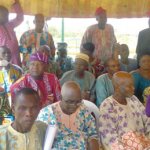Chief Oladosu Oladipo, a lawyer, politician and boardroom guru, is the national coordinator of the Yoruba Patriots Movement (YPM), a group campaigning for unity and cohesion among Yoruba in the country. In this interview with KUNLE ODEREMI, he gives a clearer insight into the project so far. Excerpts:
TALKING about the Yoruba agenda, how did it come about, and what role did you play?
Briefly, when we were in the Constituent Assembly in 1988, I had virtually got all my degrees: Law, Management, Economics and I was already a professional. Immediately I got elected, I felt that we should have a Yoruba agenda. Then, Uncle Bola Ige was very active. I contacted him and he asked me to round all the elected Constituent Assembly members in the South-West. So, I got in touch with Evangelist Bamidele Olumilua; he was not a governor then. I got in touch with Chief Segun Osoba, Oba Otudeko, Dr Soji Adejumo, Lam Adesina, and a host of other people of note. Lam Adesina was the chairman of the Oyo State caucus, and I was the secretary. One of the things we did under Alhaji Lam Adesina, Uncle Bola Ige, Baba Bisi Akande, Cornelius Adebayo, about three or four past governors were around to give us hints on how to go about it—was to able to set the minimum thing that we would accept; that if it was below that minimum, we would not accept. So, we had a Yoruba agenda, which we carried to the 1988/1989 Constituent Assembly that was inaugurated in March in 1988. After the inauguration of the Constituent Assembly, we saw on the high table a Supreme Court Justice, Anthony Anyagolu, as chairman; his deputy was Buba Addo; Babagana Kingibe as secretary, with Miss Pepple as assistant secretary. They had Igbo, Kanuri, Hausa and somebody from the South-South on the high table. So, there was no Yoruba. When we discovered the injustice, I got in touch with my chairman, Lam Adesina, and Olumilua, that we would not tolerate the situation. So, we went to Major General Olufemi Olutoye in his room and discussed what to do in the interim to register our displeasure. We concluded that after the opening prayer the following day, we should sit in our respective position in the Assembly, but that immediately after the opening prayer, we should all rise up and move to the centre of the Assembly, wait there for about two or three minutes for everybody to assemble and then file out. The following day, we did virtually as decided; one after the other; we filed out and didn’t look back.
Our action created an earthquake; it really troubled them (other members of the Constituent Assembly), as they couldn’t hold any proceeding that day. Even the order of the day had not been read before we (elected South-West delegates) took that collective action. They didn’t know why we protested. We said we were not walking out or leaving the Assembly. But, we had registered our displeasure. The following day, we assembled at the lobby and moved one after the other to take our seats. A minute or two after the order of the day and the opening prayer, Alhaji Ibrahim Dasuki (he wasn’t the Sultan of Sokoto then, but was a titled chief, after being recognised by the presiding officer, said: Agba o simo, ilu baje, bale ile ku, ile dahoro, in Yoruba. All of us were shocked, because it was only the Yoruba-speaking people from the South-West could understand the depth of that message. The Igbos, Kanuris, Hasuas, and people from the South-South could not understand. Dasuki spoke the foundation of the Yoruba language, and he translated what he said in English. Having done that, he said if anybody that composed the high table at the Constituent Assembly felt that the Yoruba were unimportant in Nigeria, that person was living in a fool’s paradise. He said that ‘the first lawyer in Nigeria was a Yoruba man; first medical doctor, Yoruba man, the first this; Yoruba man, that. When it comes to education, these people have more than 50 per cent of the educated people in the whole of Nigeria and you say you want to ignore them. Anyone that does that is doing it at his own peril.’
We were so happy, because such reaffirmation didn’t come from us. And we didn’t delegate him to do it. That was the beauty of the whole thing. What can we draw out from that? It is unity; there is strength in unity, so that unity and patriotism gave us that accolade, and we were very proud; we were happy. Immediately, signal was sent out to the then military president, Ibrahim Babangida, at Doddan Barracks (though he lived in Doddan Barracks then, he was flying from Lagos to Abuja, as the federal authorities had not created Aso Rock then.) So, they quickly made an adjustment by putting one Yoruba on the high table at the Constituency Assembly. At least, Yoruba were represented. We were happy and the whole proceedings went well. That was the product of unity. I shouldn’t praise myself because I was moving from flat to flat, house to house to really make sure that I got that done, and it was done successfully and with the assistance of other co-assembly members.
But, the issue of unity among the Yoruba remains a major concern….
During the administration of former President Goodluck Jonathan, I wasn’t happy with the way Yoruba were treated. The president hailed from the South-South; vice-president (North-West); Senate President (North-Central; Speaker (North-West), while both the deputy Senate President and deputy Speaker of the House of Representatives were from the South-East. There was nothing for us (South-West), whereas, the position of Secretary to the Government of the Federation also was given to South-East. I was the initiator/coordinator of a group called New Dimension, because there was an interregnum then. The situation persisted until there was that mild protest that brought Major General Seinde Arogbofa. That is real marginalisation because you need to be in the engine room of government. For instance, the engine room of any movement or government would be the people that are really originating decisions. It was only charlatans that believed we were getting a lot of benefits from the system. So, the majority were not happy and I am on the side of the majority. That snowballed into the present government, which the Yoruba believe they assisted in the delivery, but those who delivered are being marginalised, as we have seen. And virtually, the engine room is out of control. Virtually, nobody in Yoruba land is in the engine room. Those in the engine room are from one town, one tribe, and even one section. All the fundamentals, the key basic institutions being headed by those people are the ones that can call the people in the engine room. All others are just not facilitating but implementing whatever directive they are given. I think that Yoruba have gone past such stage, and if we could do it (resist a similar act of injustice) in 1988, and succeeded, right now, we can do greater things. So that is the idea that initiated the Yoruba Patriots Movement (YPM. It is not a socio-cultural organisation. As a matter of fact, it is a political movement, though not a political party. It is a political movement that would energise our needs. In the movement, we have the PDP, APC, Labour, Accord Party, SDP, and virtually all the existing political parties. But, what we are doing is to unite all the Yoruba. If there were differences in the past, we want to ensure that we forget all those differences. If there had been injuries one way or the other, we should forget those injuries, come together and think together, as well as plan together, strategise together, live toghether and enjoy together.
How soon is your group going to transform into a political party?
That’s the ultimate. But we are not going to form a Yoruba party. So, if any party that is worth its salt in Nigeria sees that more than 80 per cent of the people of the South-West or in the Yoruba region are in one movement, will such, even if it is an existing party or new, not want to gravitate towards that group? What is politics; is it not a game of number? Once we have the number, and we have all the fundamental for registration, the constitutions permits everybody’s fundamental human rights and freedom of association. So, we can associate and become a political party, and use our number to get to power any time God says it is time for us to be in power.
Does YPM have a programme that is quite different and distinct from what we have seen in similar groups, over the years? How?
The very cardinal thing is that we have to reset because growth and development are very germane to any society, community, tribe or nation. There must be strategy for creating wealth. There must be strategies for creating jobs for millions of the youths. There must be strategy for eliminating hunger and poverty. There must be strategy for education and technology. There must be strategy for security to checkmate any person that wants to have incursion into the peace and tranquility in the Yoruba nation. We will deal with that one ruthlessly because without security of life and property, every other thing will go into the air. So, our goal and focus centre on development. The fact is that we want to get our rights as equal partners in the commonwealth of Nigeria, and not as a junior partner. As we usually say, we don’t want to do it under the table of any tribe. We want to hold our destinies in our own hands. They have to give us our own fair share. We are not going to take any share more than we are entitled to and deserve.
WATCH TOP VIDEOS FROM NIGERIAN TRIBUNE TV
- Let’s Talk About SELF-AWARENESS
- Is Your Confidence Mistaken for Pride? Let’s talk about it
- Is Etiquette About Perfection…Or Just Not Being Rude?
- Top Psychologist Reveal 3 Signs You’re Struggling With Imposter Syndrome
- Do You Pick Up Work-Related Calls at Midnight or Never? Let’s Talk About Boundaries






